129 | The Mysterious Case of Bacon Brain | Chocolate Crisis |
Plus, racial differences in food allergies and downloadable back issues
Downloadable back issues available now;
Case Study: Contaminated food + handwashing failures cause brain infection;
Chocolate supply chains in crisis;
Food Safety News and Resources;
That’s Interesting: Race and Allergies;
A bacon pun (just for fun);
Food fraud news, emerging issues and recent incidents
Hi,
If you’re new here, thanks for joining us. A special thank you 👏👏 to Carla and Caroline D for becoming paid subscribers and Theodore, Sam, Jiri and Robert 👏👏 for renewing your subscriptions. Your financial support makes this publication possible.
The biggest shoutout goes to ✨🌟 Nathan from Australia ✨🌟, who is our newest super-supporter (a Good Apple). Thanks to Nathan we have 5 more scholarships available for students, academics and readers from developing countries. If you want one, get in touch by replying to this email.
This week I explore an unusual and icky outcome from improper hand hygiene and worry about chocolate supply chains.
Also this week, a quick note about food allergy prevalence among different racial groups and plenty of food fraud news for paying subscribers. Plus a bacon pun that will make you smile.
Cheers!
Karen
P.S. Don’t forget to join our March meet-up: It’s this week! Thursday 14th March.
Downloadable Back Issues
Go old-school with our downloadable, off-line compilations of back issues.
The latest compilation is out now, featuring Issues 101 to 125.
🍏 Get the download here (for paying subscribers) 🍏
Case Study: Contaminated Food + Handwashing Failures Cause Brain Infection
The mysterious case of bacon brain
A man in the US whose brain was scanned after he complained of headaches was found to have tapeworm larvae (Taenia solium) in his brain, a condition known as neurocysticercosis.
Neurocysticercosis is a tapeworm infection that involves the central nervous system (brain and spinal cord). It is a variant of cysticercosis, which is contracted by humans who ingest the eggs of an adult pork tapeworm (Taenia solium).
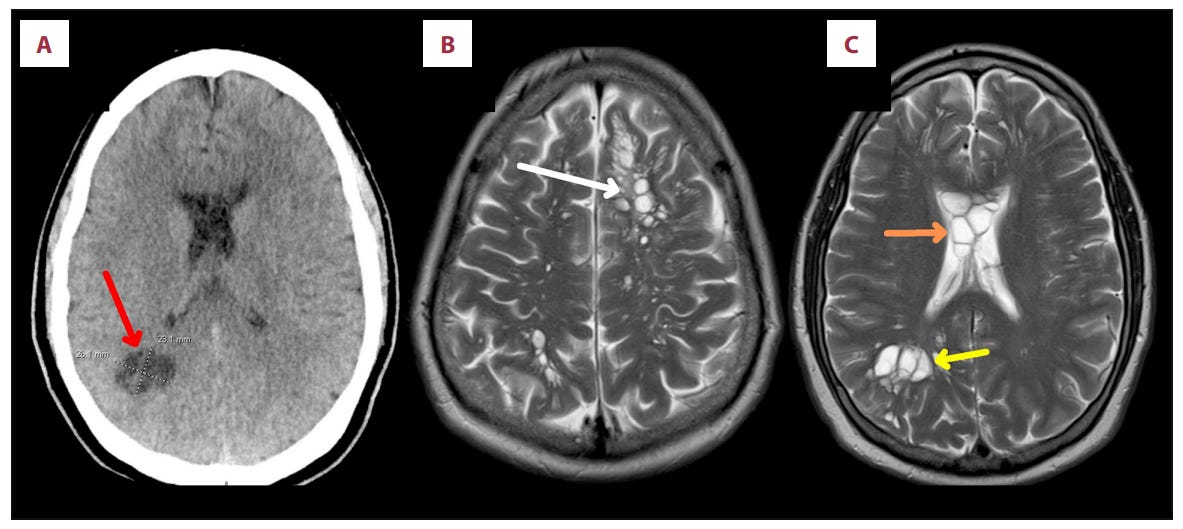
Cysticercosis occurs when tapeworm eggs hatch into larvae in the tissues of the patient, with muscles, brain, and eyes commonly affected. The larvae cause cysts to form in the tissue, which can affect the functioning of the organ. Symptoms can vary widely depending on the location and number of cysts, ranging from mild discomfort to severe neurological complications (source).
Fatality rates for people with neurocysticercosis can be as high as 26% (source).
Cysticercosis is endemic in developing countries but rare in the United States, occurring almost exclusively among immigrants or travellers from developing countries. The man in this case had no recent history of travel or any exposure to farm animals.
Cysticercosis is associated with pigs and pig meat, because Taenia solium is a pig parasite. It’s virtually non-existent in countries where pork consumption is banned, and prevalent in developing countries where pigs are raised as primary food sources.
Media reports about the recent US case said the man contracted the tapeworm cysts from eating lightly cooked, “non-crispy” bacon for “most of his life”. However, cysticercosis is not contracted directly by eating tapeworm-containing meat.
“Cysticercosis is not spread by eating undercooked meat” (US Centers for Disease Control and Prevention (CDC))
Mysterious infections
If cysticercosis is not contracted from eating tapeworm-containing meat, how do become infected?
In the 1990s, four people in an Orthodox Jewish community, whose members do not consume pig meat, developed cysticercosis, which presented as seizures and brain lesions. Researchers were baffled because the people had not been exposed to pork or pigs. The cause was ultimately attributed to the victims’ domestic workers who carried pork tapeworms in their digestive tracts (source).

Cysticercosis: it’s complicated
People who have adult tapeworms living in their digestive system, an infection known as taeniasis, shed tapeworm eggs in their faeces. When the tapeworm eggs contaminate pig food, as can happen when pigs and humans live in close proximity, their meat becomes infected and can pass tapeworms to humans if it is not properly cooked. Tapeworms usually reproduce inside pigs, not humans.
However, if tapeworm eggs contaminate human food and drinking water, the eggs can hatch inside human tissues. Tapeworm eggs get into human food when a person with tapeworms does not wash their hands properly after going to the toilet, or if human faeces contacts raw vegetables or drinking water. It is the eggs, not the parasite-containing meat, which causes cysticercosis in humans.
Adult tapeworms can live in their hosts for up to 30 years and can be as long as 6.7 meters (22 feet).
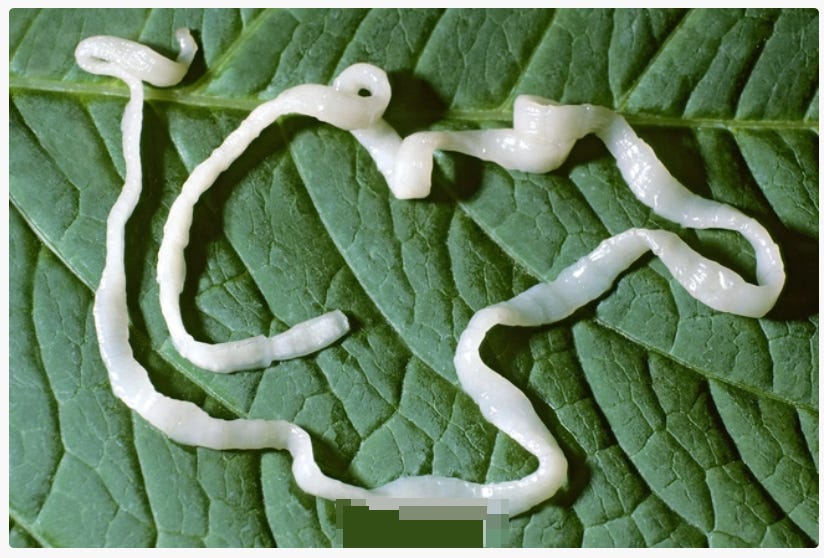
Bacon-man infects himself?
The US patient who pursued a lifetime of “non-crispy” bacon consumption did not catch cysticercosis from the bacon, and locally acquired cases of neurocysticercosis were thought to be non-existent in the United States by his medical practitioners*, who described his case in the American Journal of Case Reports.
He is thought to have become infected through autoinoculation.
Autoinoculation in this case means the doctors believe he was carrying adult tapeworms in his digestive tract and managed to transmit their eggs to his food or mouth from not washing his hands properly after toileting. In the case report, it’s suggested he contracted tapeworm (taeniasis) from his long history of consuming lightly cooked bacon, although no supporting evidence was provided.
Taenia solium in food
The only foods which can cause a tapeworm intestinal infestation of the type in this case, Taenia solium, are pork-based, according to the US CDC. Other species of tapeworm are associated with beef meat, fish meat and dog faeces.
Data on the prevalence of tapeworm infection and cysticercosis in the US is scant, and the prevalence of Taenia solium in meat in the US food supply appears non-existent. Among the 525,000 infections attributed to pork in the United States between 1998 and 2015, none were linked to Taenia solium (source).
A survey in Laos which looked for Taenia solium in 590 pig carcasses found less than 1% to be infected. Tissues from the infected pigs contained significant numbers of viable cysts.
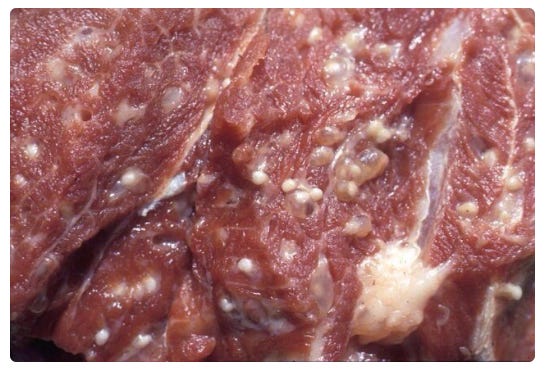
When pork meat is affected by tapeworm, cysts can be seen with the naked eye. They are sometimes described as appearing like grains of sticky rice. The cysts are inactivated by heat, and infected meat is safe to eat after thorough cooking.
Takeaways for food professionals
Tapeworms are parasites which can infect people through contaminated food. The presence of adult tapeworms in humans does not cause serious symptoms, however they can lead to a serious secondary infection if tapeworm eggs from an infected person are ingested.
Doctors recently reported on a man in the United States who had tapeworm-larval cysts in his brain (neurocysticercosis). They suspect he acquired the disease through autoinfection, by improperly washing his hands after using the toilet while carrying tapeworm in his own intestinal tract.
They reported that he had tapeworms because of his “lifetime” habit of eating lightly cooked, “non-crispy” bacon, although no evidence was included in their case report.
Pork meat containing tapeworm cysts is safe to eat after it has been thoroughly cooked to at least 63°C (145° F) for whole cuts and 71°C (160° F) for ground meat and allowed to rest for three minutes (source).
People with tapeworm infestations (taeniasis) can pose risks to others if they do not wash their hands properly after using the toilet. Tapeworm eggs from their faeces can lead to serious illness and death by causing cysticercosis and neurocysticercosis, which happens if tapeworm eggs are ingested and subsequently hatch inside a person’s brain, muscle or eyes. Neurocysticercosis has a high fatality rate.
To prevent cysticercosis and neurocysticercosis, always cook pork meat properly, wash hands thoroughly after using the toilet and keep human sewage away from food and water sources.
In short: A man in the US who experienced severe neurological symptoms was found to have cysts from pork tapeworm in his brain (neurocysticercosis) 🍏 The disease was attributed to his habit of eating lightly cooked bacon and not washing his hands properly 🍏 Neurocysticercosis cannot be caught from eating undercooked meat but can be acquired from someone who has adult tapeworms in their digestive tract, a condition known as taeniasis, if they do not wash hands properly after using the toilet 🍏 The prevalence of pork tapeworm in the US food supply is unknown but thought to be very low 🍏 Meat from tapeworm-infected pigs is safe to eat if properly cooked 🍏 Food contaminated with tapeworm eggs through improper hygiene is not safe to eat and can lead to illness and death 🍏
Further reading:
Neurocysticercosis Presenting as Migraine in the United States (American Journal of Case Reports)
CDC - Taeniasis - General Information - Frequently Asked Questions (FAQs)
Main source:
Byrnes E, Shaw B, Shaw R, Madruga M, Carlan S (2024) Neurocysticercosis Presenting as Migraine in the United States. Am J Case Rep 2024; 25:e943133. DOI: 10.12659/AJCR.943133. Available from https://amjcaserep.com/abstract/index/idArt/943133
*Cantey, et. al. (2014) disagree, saying “Neurocysticercosis may be locally acquired by US residents”
Chocolate Supply Chains in Crisis
The cost of cocoa, which has been rising since 2021, doubled in the first two months of this year, caused by global supply pressures from climate change and extreme weather events in the world’s major growing regions.
More than half the world’s cocoa is produced in just two neighbouring countries: Cote d’Ivoire and Ghana, in West Africa. Being in the same region they are largely affected by the same weather events such as droughts, which reduce cocoa bean yield, and too much rain which puts cocoa trees at risk of rotting diseases.
With cocoa being a major ingredient in chocolate, it’s unsurprising that chocolate prices have increased as well, up by 25% in the past two years. But it’s not only cocoa that is becoming more expensive, sugar prices are up too, putting extra pressure on chocolate manufacturers.

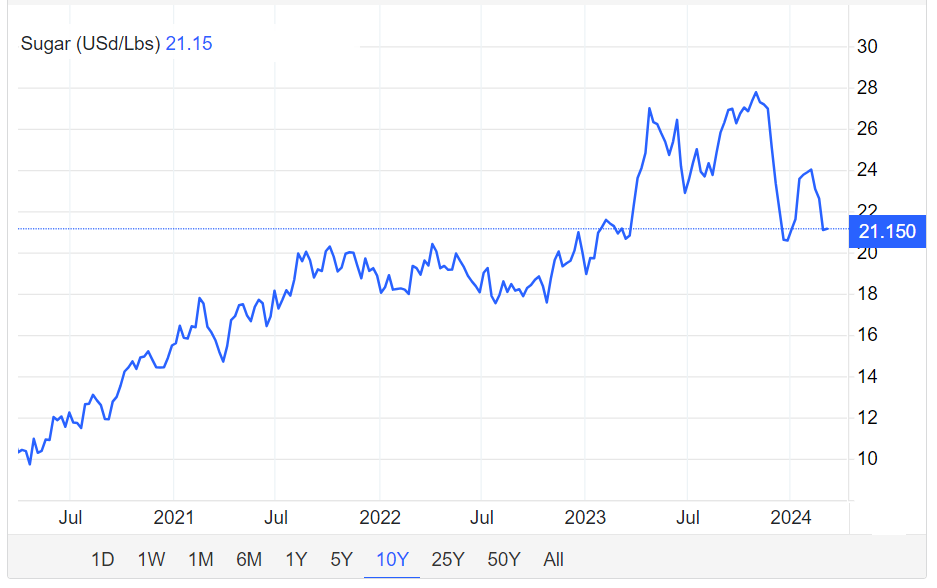
Cocoa production is projected to fall by 11% (year on year) for the 2023/2024 season. Traders are concerned about ageing cocoa trees and underinvestment in West African cocoa farms, two factors which will keep supplies tight. Trees in Cote d’Ivoire and Ghana, the two largest cocoa-producing countries, are affected by swollen shoot disease (source).
Ecuador, the largest cocoa producer outside of West Africa, experienced arid weather conditions in 2023, reducing yields there (source). Cocoa shipped from Cote d’Ivoire, one of the world’s largest producers was 30% lower in the past six months compared to the same time the previous year.

What to expect
Prices are expected to stay high or increase further for the foreseeable future. Where prices increase, the likelihood of food fraud can increase too. Higher prices can provide more motivation for food fraud perpetrators and may make certain frauds more profitable.
Possible frauds in cocoa and chocolate include:
misrepresentation of geographical origin, for example, “Belgium chocolate” that is not from Belgium;
misrepresentation of organic status;
false, misleading or forged certifications such as Fair Trade or Rainforest Alliance Certified. Such frauds can be perpetrated at multiple points in the supply chain, from the farm to traders, processors, blenders, resellers, wholesalers and finished product manufacturers;
cocoa beans blended (diluted) with undeclared lower-quality or uncertified beans;
theft of raw beans, as has happened in Cameroon recently;
adulteration of raw beans with rocks and sticks to increase container weight.
Confectionery manufacturers are already attempting to reduce costs by decreasing pack sizes - a practice known to consumers as “shrinkflation”, and a major US manufacturer, Hershey, has revealed it plans to lay off staff this year.
Perhaps the most intriguing of all predictions for chocolate is the rise of ‘alt-chocolate’ such as one by Voyage Foods. The US-based company envisions its chocolate replacement will be suitable for mass-produced, low-priced candies and snacks. It is made from seeds, sugar and palm oil (source).
Further reading:
🍏 Problems with Ethical Certifications in Chocolate | The Rotten Apple Issue 13 🍏
🍏 Compliance Risks in Cocoa Supply Chains | The Rotten Apple Issue 114 🍏
That’s Interesting: Race and Allergies
Racial, ethnic, and socioeconomic differences affect the prevalence of food allergies. A food allergy study published in 2023, which surveyed a nationally representative sample of US residents seems to show that Asian, Hispanic, and non-Hispanic Black people are more likely to have food allergies than non-Hispanic white people.
Source:
Jiang, J., Warren, C.M., Brewer, A., Soffer, G. and Gupta, R.S. (2023). Racial, Ethnic, and Socioeconomic Differences in Food Allergies in the US. JAMA Network Open, [online] 6(6), p.e2318162. doi: https://doi.org/10.1001/jamanetworkopen.2023.18162.
Food Safety News and Resources
Our news and resources section has not-boring food safety news plus links to free webinars and guidance documents: no ads, no sponsored content, only resources that I believe will be genuinely helpful for you.
This week’s lowlight: more lead-contaminated cinnamon found in the US :(
Click the preview below to access it.
Food Safety News and Resources | March
Bacon Bacon Bacon (Just for Fun)
And now, a collection of bacon-flavoured memes, inspired by today’s brain infection story.
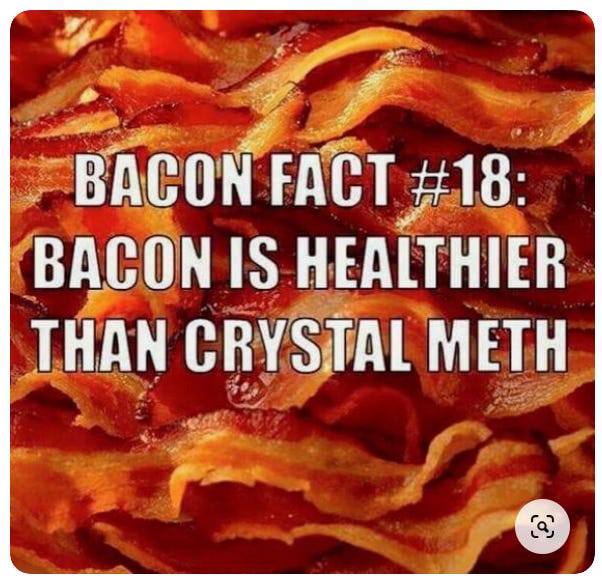


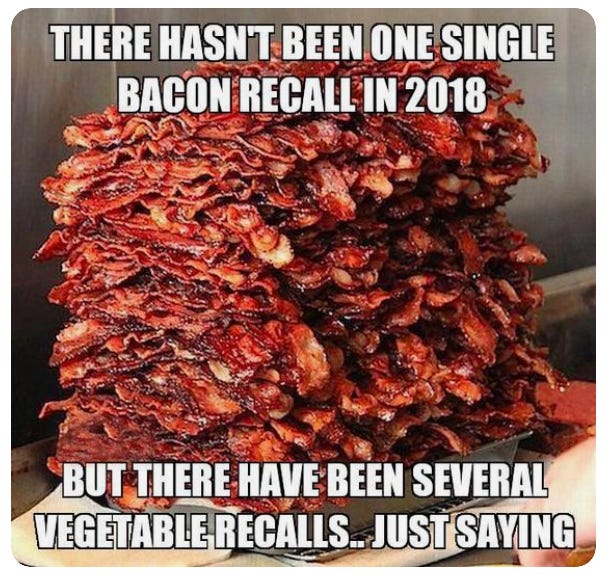
Reminder: The Rotten Apple Podcast is out now. Each episode is a 15 - 20 minute, low-fuss rendition of this email, read aloud by me.
Episodes can be listened to using a podcast app. Click this link on your phone to get connected. Or listen directly in your browser by simply clicking the 🎧 link near the top of the email.
Below for paying subscribers: Food fraud news, horizon scanning and incident reports
📌 Food Fraud News 📌
In this week’s food fraud news:
📌 Fraudulent certifications on snackfood;
📌 Fake butter, frozen fish conceals cocaine;
📌 Potato fraud, mealie meal fraud, organic rice;
📌 Warning over supply chain disruptions.
Keep reading with a 7-day free trial
Subscribe to The Rotten Apple to keep reading this post and get 7 days of free access to the full post archives.




